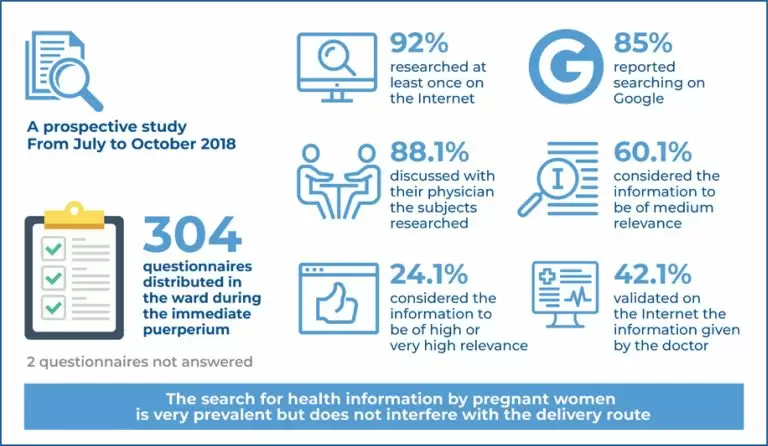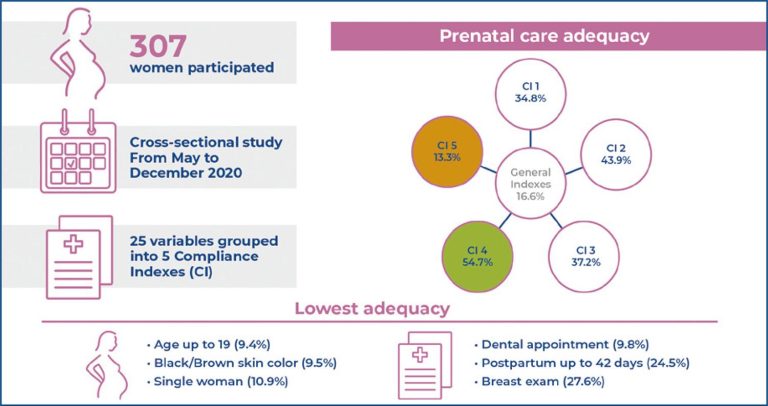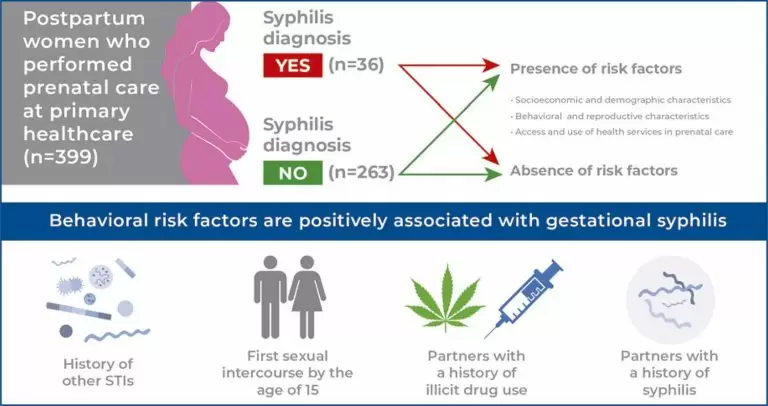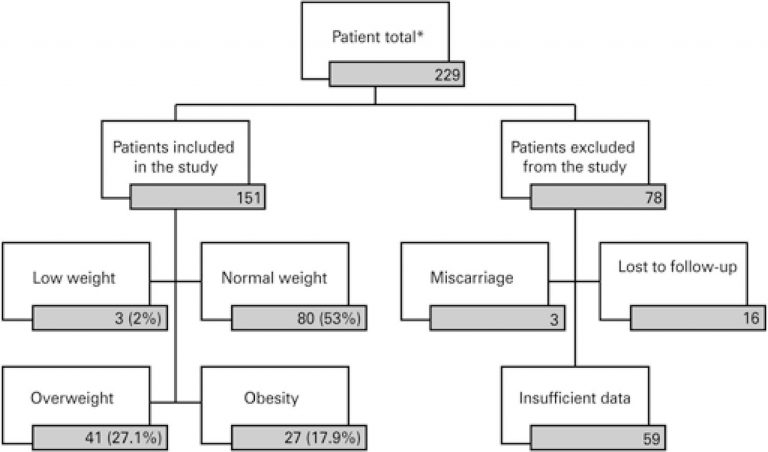22/Mar/2024
Internet use by pregnant women during prenatal care
DOI: 10.31744/einstein_journal/2024AO0447
Highlights High internet use: 92% of pregnant women used the internet to access health information during prenatal care. Top search topics: fetal development, nutrition, and childbirth were the primary topics of interest. Doctor-patient discussions: 88.1% discussed online findings with doctors, emphasizing patient engagement. No impact on delivery route: despite extensive internet use, no statistical impact on delivery route choice was observed. ABSTRACT Objective: The search for medical information on the internet is a part of people’s daily lives. Exponential volumes […]
Keywords: Consumer health information; Information seeking behavior; Internet search; Medical informatics; Pregnant Women; Prenatal care; Surveys and questionnaires
25/Jul/2023
Quality assessment of prenatal and puerperium care
DOI: 10.31744/einstein_journal/2023AO0094
Highlights Efforts should be made to improve all aspects of prenatal care. The criteria used in this study were multidimensional and cover different aspects of care. Prenatal care must include recognition of socioeconomic and cultural differences among users. ABSTRACT Objective To evaluate prenatal and puerperium care levels received and identify their association with sociodemographic and obstetric characteristics. Methods This cross-sectional study was conducted from May to December 2020 and included women who gave birth at the Municipal Hospital of […]
Keywords: Family nurse practitioners; Outcome and process assessment (Health Care); Prenatal care; Public health; Quality of Health Care
07/Mar/2023
Factors associated with women diagnosed with syphilis who received prenatal care in a primary healthcare unit
DOI: 10.31744/einstein_journal/2023AO0046
Highlights History of sexually transmitted infections and first sexual intercourse by the age of 15. History of syphilis in the partner, and partners using illicit drugs were all positively associated with gestational syphilis. ABSTRACT Objective To estimate the prevalence of syphilis and its associated factors in women who were treated at public maternity hospitals and received prenatal care in a primary healthcare unit. Methods This cross-sectional study included 399 postpartum women. Interviews were conducted, and additional data were extracted from […]
Keywords: Pregnancy complications, infections; Prenatal care; Primary Health Care; Risk Factors; Syphilis; Syphilis, congenital
03/Dec/2019
Prevalence of rectovaginal colonization by group B Streptococcus in pregnant women seen at prenatal care program of a health organization
einstein (São Paulo). 03/Dec/2019;18:eAO4920.
View Article03/Dec/2019
Prevalence of rectovaginal colonization by group B Streptococcus in pregnant women seen at prenatal care program of a health organization
DOI: 10.31744/einstein_journal/2020AO4920
ABSTRACT Objective To evaluate the prevalence of group B Streptococci in pregnant women of a corporate health program, as well as the epidemiological correlations. Methods This retrospective study used medical records of patients who participated of the prenatal care program at a private hospital in the city of São Paulo (SP), Brazil, from 2015 to 2016. Those who abandoned the program or had incomplete data in their medical records were excluded. Quantitative variables were described by means, standard deviations, median, […]
Keywords: Epidemiology; Pregnancy; Pregnancy complications, infectious/diagnosis; Prenatal care; Prevalence; Risk Factors; Streptococcus agalactiae; Viridans streptococci
29/Oct/2019
Pregestational body mass index, weight gain during pregnancy and perinatal outcome: a retrospective descriptive study
DOI: 10.31744/einstein_journal/2020AO4851
ABSTRACT Objective To analyze the pregestational body mass index and weight gain during pregnancy, and to associate data to perinatal outcomes of pregnant women from a Prenatal Care Program. Methods A retrospective study was carried out with 151 patients seen at the Healthy Gestation Program of Hospital Israelita Albert Einstein . Data were collected from a medical chart review of the patients seen between March 2015 and March 2016. Results The chance of developing gestational diabetes for obese patients in […]
Keywords: Body mass index; Diabetes, gestational; Obesity; Perinatal care; Pregnancy; Prenatal care; Weight gain
19/Apr/2018
Sociodemographic factors associated with pregnant women’s level of knowledge about oral health
DOI: 10.1590/S1679-45082018AO4079
ABSTRACT Objective To evaluate knowledge on oral health and associated sociodemographic factors in pregnant women. Methods A cross-sectional study with a sample of 195 pregnant women seen at the Primary Care Unit Paraisópolis I, in São Paulo (SP), Brazil. For statistical analysis, χ2 or Fisher’s exact test and multiple logistic regression were used. A significance level of 5% was used in all analyses. Results Schooling level equal to or greater than 8 years and having one or two children were […]
Keywords: Oral health; Pregnant Women; Prenatal care; Primary Health Care; Social conditions
04/Sep/2017
Preimplantation genetic diagnosis associated to Duchenne muscular dystrophy
DOI: 10.1590/S1679-45082017RC3994
ABSTRACT Duchenne muscular dystrophy is the most common muscle disease found in male children. Currently, there is no effective therapy available for Duchenne muscular dystrophy patients. Therefore, it is essential to make a prenatal diagnosis and provide genetic counseling to reduce the birth of such boys. We report a case of preimplantation genetic diagnosis associated with Duchenne muscular dystrophy. The couple E.P.R., 38-year-old, symptomatic patient heterozygous for a 2 to 47 exon deletion mutation in DMD gene and G.T.S., 39-year-old, […]
Keywords: Case reports; Comparative genomic hybridization; Muscular dystrophy, Duchenne; Polymerase chain reaction; Prenatal care
01/Apr/2010
The need to include obstetric nurses in prenatal care visits in the public health system
DOI: 10.1590/S1679-45082010RW1486
ABSTRACT Objective: To investigate, with a qualitative approach, the role of Obstetric Nurses at the primary level of care given to women’s health as a vital component of the multidisciplinary team, which today is fundamental for providing care, prevention as well as health education and promotion, especially in programs whose activities are geared towards primary care of pregnant, parturient, and puerpera women. Methods: Brazilian laws and the determinations of Nursing Councils in reference to the activities of the obstetric nurse […]
Keywords: Nurse's role; Obstetrical nursing; Prenatal care; Public assistance







